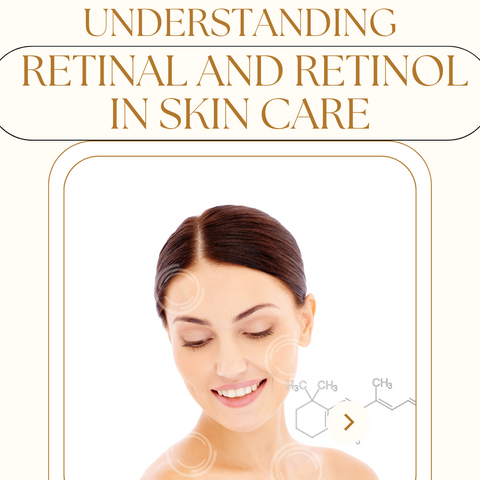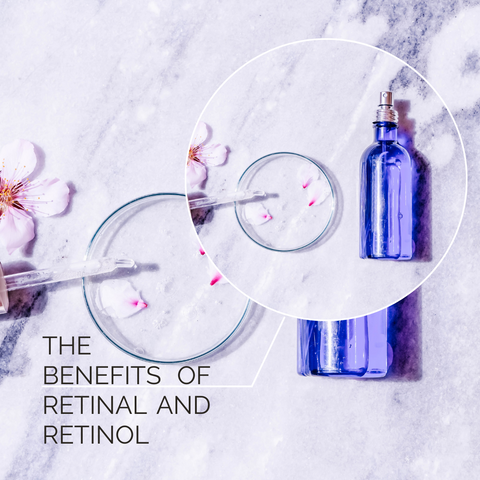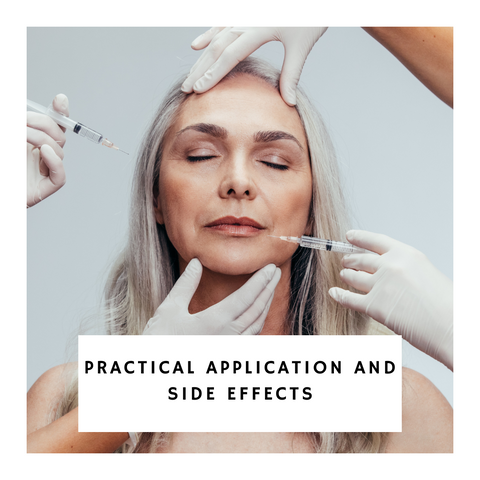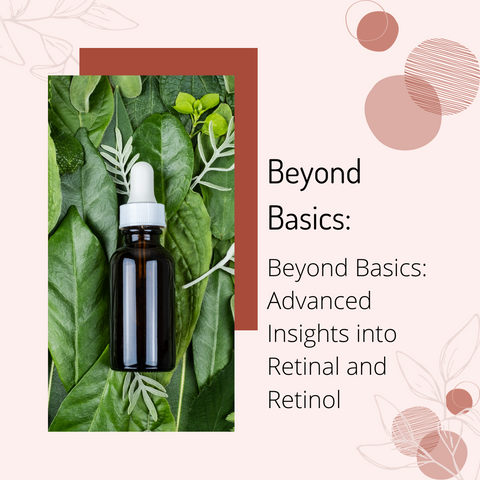Retinal and retinol are both types of vitamin A that belong to the retinoids family, which are well-known for their skin-beneficial properties. They are known for their ability to improve skin texture, decrease fine lines and wrinkles, and boost general skin health and play important roles in numerous skincare regimes. However, they differ significantly in terms of potency and efficiency.
Understanding Retinal and Retinol in Skin Care

Retinal and retinol are two types of vitamin A derivatives known as retinoids that are widely utilised in skincare due to their numerous benefits. They affect skin cell turnover, collagen formation, and general skin health. Understanding their qualities and distinctions might assist you in choosing the best product for your skincare routine. Gradually adding these compounds and watching skin reactions can assist in determining the best alternative for attaining your skincare objectives.
The Science Behind Retinal and Retinol
The science of retinal and retinol is found in their chemical structures and how they interact with the skin at the cellular level. Both retinal and retinol are members of the vitamin A-derived retinoid family and play critical roles in a variety of biological processes, including skin health. Understanding the molecular variations between retinal and retinol aids in understanding their differing potency and usefulness in skincare. Each has advantages and disadvantages, making it critical to choose the right one depending on individual skin needs and tolerance levels. Consultation with a skincare professional can help you make an informed selection based on your individual skincare objectives and issues.
Key Differences in Composition and Effectiveness
The primary distinctions between retinal and retinol in skincare are their molecular composition, potency, and effectiveness:
Composition:
-
Retinol: When compared to retinal, retinal is a larger molecule. Retinol undergoes two enzymatic conversion steps within the skin before becoming active retinoic acid. Because of the conversion process, it is less potent and takes longer to exert its effects on the skin. Generally more stable and less prone to oxidation than retinal.
-
Retinal (Retinaldehyde): Its molecular structure is smaller than that of retinol, which facilitates easier skin absorption. Becomes active retinoic acid through a single enzymatic conversion step, which increases its potency and speeds up its action compared to retinol. Because it is closer to the active form of vitamin A, it is more potent and effective.
Effectiveness:
-
Retinol: Increases collagen production, brightens the appearance of the skin, minimises fine lines and wrinkles, and improves skin texture. Since it is less effective, results might take longer to show. It needs to be used consistently for a long time.
-
Retinal: Promotes collagen production, reduces fine lines and wrinkles, and improves skin texture more quickly and efficiently. Compared to retinol, it is more potent and yields faster results. But it might irritate skin more, especially in those who are sensitive.
Understanding the differences in composition and efficacy is critical in selecting the best retinoid for specific skincare requirements and problems. Incorporating these products gradually into a skincare routine and watching skin reactions can help establish the best option for obtaining desired skincare results. A dermatologist or skincare specialist can make personalised recommendations depending on your skin type and problems.
Suitability for Different Skin Types
Given their potency as vitamin A forms, retinal and retinol can be extremely beneficial for a range of skin types. Their applicability, however, can vary depending on individual skin issues, sensitivities, and tolerance levels. Normal skin, sensitive skin, dry skin, oily or acne-prone skin, ageing or mature skin, and combo skin are all suitable. Understanding how retinal and retinol interact with different skin types aids in choosing the best option for attaining skincare goals while minimising any side effects. Proper skincare routines and gradual introduction can help maximise benefits while minimising discomfort or irritation.
The Benefits of Retinal and Retinol

Retinal and retinol, both vitamin A derivatives and members of the retinoid family, have numerous skincare benefits. These ingredients are well-known for their ability to address a variety of skin concerns while also promoting overall skin health. The following are the primary advantages of retinal and retinol:
-
Increased potency, faster and more effective results, improved skin tone and texture, and anti-aging properties are all advantages of retina.
-
Retinol benefits include being gentle for beginners, improving skin texture and appearance, increasing collagen production, and addressing a variety of skin concerns.
-
Both benefit from collagen production, increased cell turnover, fine line and wrinkle reduction, and improved skin radiance.
Retinal and retinol have been shown to be effective in skincare, offering a variety of benefits for different skin types and concerns. Incorporating these ingredients into a consistent skincare routine can result in significant improvements in skin texture, tone, and overall appearance over time.
How Retinal Works to Improve Skin
Retinal, also known as retinaldehyde, is a kind of vitamin A that plays an important role in skin health and the treatment of numerous skin issues. Retinal's capacity to convert into active retinoic acid within the skin helps it exert its effects faster than retinol. Its potency and effectiveness in encouraging skin renewal, collagen synthesis, and overall skin health make it an important element in skincare formulas aimed at alleviating a variety of skin issues.
Retinol's Role in Anti-Aging and Skin Renewal
Because of its potential to impact cellular processes and skin functions, retinol, a vitamin A derivative and part of the retinoid family, plays an important role in anti-aging and skin renewal. Its impact on skin health is generally acknowledged, particularly in preventing ageing symptoms and encouraging skin renewal. Here's how retinol helps in anti-aging and skin renewal:
-
Accelerated Skin Cell Renewal: Retinol promotes skin cell turnover by increasing the loss of older, dead skin cells and stimulating the synthesis of new, healthier cells. This procedure helps to improve the texture of the skin, making it smoother and more luminous.
-
Stimulation of Collagen Synthesis: Retinol promotes the formation of collagen, a necessary protein for maintaining skin suppleness and firmness. Increased collagen production can aid in the reduction of fine lines and wrinkles, resulting in a more youthful appearance.
-
Reduction of Fine Lines and Wrinkles: Retinol reduces the appearance of fine lines and wrinkles, particularly those induced by sun exposure or ageing, by increasing collagen and stimulating cell turnover.
-
Refinement of Skin Tone and Texture: Retinol improves skin tone, removes hyperpigmentation, and smooths or evens out skin texture, resulting in smoother, more uniform skin.
-
Mitigation of Hyperpigmentation and Dark Spots: Retinol can diminish black spots, sun spots, and age spots by encouraging the creation of new cells with more even pigmentation and assisting in the shedding of pigmented skin cells.
-
Acne Management: Because of its capacity to control skin cell turnover and avoid pore blockages, retinol is useful in acne management by minimising the creation of comedones (clogged pores) and encouraging cleaner skin.
-
Antioxidant Benefits: Retinol works as an antioxidant, neutralising free radicals that cause skin ageing and damage from environmental causes such as UV radiation and pollution.
-
Important Considerations:
-
Patience and gradual introduction: It is critical to gradually introduce retinol into a skincare routine to allow the skin to adapt and minimise potential irritation or dryness, especially for sensitive skin types.
-
Sun Protection: As retinol can make skin more sensitive to the sun, regularly applying sunscreen is essential to shielding the skin from UV radiation.
Addressing Acne and Hyperpigmentation
Retinol's capacity to control cell turnover, clear clogged pores, and encourage more even skin tone makes it useful for treating both acne and hyperpigmentation. Here's how retinol can assist with certain skin difficulties, like regulating skin cell turnover, unclogging pores, reducing inflammation, preventing fresh breakouts, promoting skin regeneration, balancing out skin tone, and reducing dark spots. Because of its ability to control cell turnover, clear pores, and promote more even skin tone, retinol is an important component of acne and hyperpigmentation skincare programmes. Individual reactions to retinol might vary, so it's critical to determine the best concentration and frequency of use based on your skin type and sensitivity.
Practical Application and Side Effects

When incorporating retinol into your skincare routine, it's critical to adhere to practical application instructions and be aware of any side effects in order to maximise its advantages while minimising any negative responses. Consider the following practical recommendations and probable adverse effects:
Practical Application:
-
Start Gradually: To give your skin time to adjust, start with a lower concentration of retinol. Begin with every other day or a few times per week, and gradually increase frequency as tolerated.
-
Patch Test: Before applying retinol to your entire face, perform a patch test on a small area of skin to check for any adverse reactions or irritation.
-
Apply to Clean, Dry Skin: After cleansing, apply retinol to clean, dry skin at night. To avoid irritation, wait until your skin is completely dry before applying retinol.
-
Pea-Sized Amount: To prevent overuse, especially in the beginning, apply a pea-sized amount to your entire face.
-
Apply Moisturiser After: Use a moisturiser after to help relieve any possible dryness or irritation.
-
Use Sunscreen Every Day: Retinol can make your skin more sensitive to the sun, so if you want to shield your skin from UV rays, you must put on sunscreen first thing in the morning.
Potential Side Effects:
-
Dryness and Irritation: Especially in the early phase of adjustment, retinol may result in dryness, redness, flakiness, or irritation. These side effects usually go away as the skin adjusts, but if they don't, cut back on how often you apply retinol.
-
Enhanced Sun Sensitivity: Retinol may increase your skin's susceptibility to UV radiation and sunburn. It is essential to use sunscreen every day and to limit your time spent in the sun.
-
Peeling or flaking: A few people may have peeling or flaking, especially in dry areas like the mouth or nose.
-
Stinging or Burning Sensation: Applying retinol to sensitive skin may cause a stinging or burning sensation. If this occurs, reduce the frequency of use or temporarily discontinue use.
-
Pregnancy and Nursing: Individuals who are pregnant or nursing should consult a healthcare professional before using retinol, as it is generally not recommended due to its potential effects on foetal development.
Consultation with a Professional:
-
If you have specific skin concerns or are experiencing persistent irritation or side effects, seek advice from a dermatologist or skincare professional. They can advise you on the best retinol concentration, application frequency, and additional products to supplement your skincare regimen.
Understanding how to apply retinol correctly and being aware of potential side effects can help you incorporate this ingredient into your skincare routine more effectively. A gradual introduction and proper skincare practices can help minimise discomfort and maximise the benefits of retinol for your skin.
Incorporating Retinal into Your Routine
To guarantee efficient use while minimising any discomfort, incorporate retinal into your skincare routine with caution. Here's how to incorporate retinal into your routine: Find the proper product, patch test, start with infrequent use, gently cleanse, apply to dry skin, use a pea-sized amount, and follow directions. Apply moisturiser and sunscreen on a daily basis, and monitor skin sensitivities.
Tips for Success:
-
Be patient: It may take several weeks for the effects of retinal therapy to become apparent. Consistency and patience are required to see significant improvements in skin texture and tone.
-
Avoid Harsh Products: To avoid over-exfoliation and increased sensitivity, avoid combining retinal with harsh exfoliants or other potentially irritating skincare products.
-
Consult a Professional: If you are not sure how to incorporate retinal into your routine or if you have specific skin concerns, consult a dermatologist or skincare professional.
The key to reaping the benefits of retinal while minimising potential adverse reactions is to gradually incorporate it into your skincare routine and observe how your skin responds. Individual skin tolerance and needs may necessitate adjustments in frequency or concentration.
Managing Retinol Sensitivity and Sun Exposure
Managing retinol sensitivity and sun exposure is critical for ensuring retinol's effectiveness in your skincare routine while minimising potential side effects, particularly increased sun sensitivity. Here are some tips for dealing with retinol sensitivity and sun exposure:
-
Start slowly: If you have sensitive skin, introduce retinol into your skincare routine gradually. To allow your skin to adjust, start with a lower concentration or use retinol products less frequently.
-
Patch Test: Perform a patch test on a small area of skin before applying retinol to your entire face to check for any adverse reactions or irritation.
-
Use Sparingly: Apply retinol to your entire face with a pea-sized amount. Avoid applying near the eyes and sensitive areas like the corners of the mouth or nostrils.
-
Avoid Harsh Products: Refrain from using abrasive scrubs or harsh exfoliants in conjunction with retinol to prevent over-exfoliation and increased sensitivity.
-
Moisturise: Apply a moisturiser afterward to help relieve any dryness or irritation caused by retinol use.
-
Apply Sunscreen Daily: Retinol might make your skin more sensitive to the sun. To protect your skin from UV damage, apply a broad-spectrum sunscreen with an SPF of 30 or higher every morning, regardless of the weather.
-
Reapply Sunscreen: Reapply sunscreen every two hours, especially if you're outdoors or exposed to direct sunlight for an extended period.
-
Use Retinol at Night: Include retinol in your evening skincare routine. Because retinol can make your skin more sensitive to sunlight, using it at night decreases your risk of sun exposure.
-
Observe Skin Reactions: Keep an eye on how your skin reacts to retinol. Mild tingling, redness, or dryness may occur at first, but will lessen as your skin adjusts. If serious discomfort persists, temporarily halt use and visit a dermatologist.
-
Reduce Frequency: If you experience significant irritation, consider reducing the frequency of retinol application or using a lower concentration until your skin adjusts.
-
Seek Professional Advice: Consult a dermatologist or skincare specialist for personalised advice and recommendations if you're unsure how to manage retinol sensitivity or sun exposure.
Best Practices for Using Retinoids Safely
To use retinoids safely, you must use proper application techniques, monitor skin sensitivities, and incorporate them into your skincare routine responsibly. Start carefully, use proper application techniques, sun protection, time of application, monitor skin reactions, make adjustments based on sensitivity, consult a professional, and be consistent and patient. You may safely incorporate retinoids into your skincare routine by following these best practises, allowing you to receive their advantages while minimising potential irritation and sensitivity. For the safe and successful use of retinoids, consistency, appropriate application, and sun protection are essential.
Beyond Basics: Advanced Insights into Retinal and Retinol

Some advanced insights into retinal and retinol, investigating deeper aspects of their use in skincare, are advanced mechanisms of action, advanced benefits, advanced formulations and delivery systems, combination therapy and synergies, advanced considerations, and expert guidance. These advanced insights go deeper into the mechanics, formulations, and methods for using retinal and retinol in skincare. Advanced formulations and combination therapies provide novel strategies to maximise the benefits of retinoids while minimising potential adverse effects for improved skincare results. Consultation with a skincare specialist can provide important advice for advanced retinoid use.
Prescription vs. Over-the-Counter Retinoids
Prescription and OTC retinoids differ in several ways, including potency, formulation, and availability. Understanding their distinctions might help you choose the best alternative for your skin concerns and preferences:
Prescription Retinoids:
-
Potency and Strength: Prescription retinoids such as tretinoin (Retin-A), tazarotene (Tazorac), and adapalene (Differin) are usually more potent than over-the-counter retinoids. They are more concentrated, resulting in speedier and more obvious outcomes.
-
Effectiveness: They tend to be more effective in addressing severe acne, stubborn hyperpigmentation, and deeper wrinkles due to their higher potency and direct impact on skin cells.
-
Formulation Variety: Prescription retinoids are available in a variety of forms, such as creams, gels, and lotions, allowing for customisation based on skin type and condition.
-
Availability: They are provided from pharmacies after a prescription from a healthcare provider, usually a dermatologist or a physician.
-
Potential Side Effects: They might cause more pronounced side effects such as redness, peeling, dryness, and increased sun sensitivity due to their higher potency. These effects might be more noticeable, especially during the initial stages of use.
Over-the-Counter (OTC) Retinoids:
-
Potency and Strength: OTC retinoids like as retinol, retinaldehyde, or adapalene (at lower dosages) are often milder than prescription retinoids. Due to their lesser efficacy, they take longer to show observable results.
-
Effectiveness: OTC retinoids are beneficial for mild to moderate skin issues, aiding in the improvement of skin texture, fine wrinkles, and uneven skin tone with long-term use.
-
Formulation Variety: They are available in a variety of formulas, including serums, creams, and oils, to accommodate diverse skin types and preferences.
-
Availability: OTC retinoids are widely available without a prescription in many healthcare and cosmetic retailers, making them more accessible.
-
Potential Side Effects: They have lesser adverse effects than prescription retinoids, including as minor irritation, dryness, or flakiness, especially during the first adjustment period.
Prescription and over-the-counter retinoids both provide benefits for enhancing skin texture, combating indications of ageing, and controlling some skin problems. The choice relies on the severity of the skin troubles, skin sensitivity, and the desired level of potency and effectiveness.
Long-term Benefits and Considerations
The long-term benefits of utilising retinoids, both prescription and over-the-counter (OTC) ones like retinol, for general skin health can be substantial. However, there are several things to consider when introducing retinoids into a long-term skincare routine. When used consistently and carefully, retinoids provide considerable long-term benefits for skin health and appearance. Gradual introduction, adequate application techniques, sun protection, and skin reaction monitoring are critical for maximising long-term benefits while minimising potential negative effects. A skincare specialist can provide individualised advice for long-term retinoid use depending on particular skin issues and goals.









































